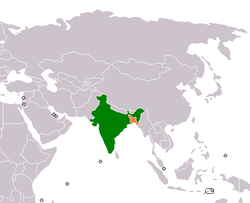Indo-Bangladeshi Treaty of Friendship, Cooperation and Peace
 |
|
|
India |
Bangladesh |
|---|---|
The India-Bangladesh Treaty of Friendship, Cooperation and Peace was a 25-year treaty that was signed on 19 March 1972 forging close bilateral relations between India and the newly established state of Bangladesh. The treaty was also known as the Indira-Mujib Treaty, after the signatories of the treaty the Prime Minister of India Indira Gandhi and the Prime Minister of Bangladesh Sheikh Mujibur Rahman.
During the Bangladesh Liberation War of 1971, India provided extensive aid, training and shelter for the exiled government of Bangladesh and Bengali nationalist Mukti Bahini guerrilla force that was fighting the Pakistani Army. Between 8 and 10 million refugees poured into India during 1971, increasing tensions between India and Pakistan. At the outbreak of the Indo-Pakistani War of 1971, the Joint Force including regular army of Bangladesh, Mukti Bahini and the Indian Military liberated then East Pakistan, leading to the establishment of Bangladesh. India's role in the independence of Bangladesh led to the development of strong bilateral relations. Then-Indian Prime Minister Indira Gandhi spoke along with Bangladesh's founding leader Sheikh Mujibur Rahman before more than 500,000 people at Suhrawardy Udyan in Dhaka.
The twelve Articles incorporated in the treaty were:
(i) The contracting parties solemnly declare that there shall be lasting peace and friendship between the two countries and each side shall respect the independence, sovereignty and territorial integrity of the other and refrain from interfering in the internal affairs of the other side;
...
Wikipedia
